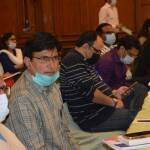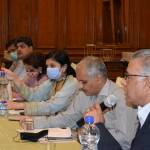LAHORE, Pakistan: The Working Group for Inclusive Education (WGIE) and the Centre for Social Justice (CSJ) organized a briefing/consultation meeting with eminent experts in education including Dr. Abdul Hameed Nayyar, Peter Jacob, Dr. Riaz Ahmad Shaikh, Farid Panjwani, Nida Usman, Zubeida Mustafa, and Zeeba Hashmi.
In anticipation of the launch of the National Education Policy (NEP) 2021 by the Ministry of Federal Education, experts underlined the possible solutions to the challenges in the policy sphere.
The participants appreciated that the Ministry intends to accommodate broad-based public consultations in the process but noted with regret that education has been one of the most neglected sectors, exemplified in failure to achieve desired literacy rates and education standards.
As a way forward, the participants stressed that policy should not be crafted in haste, the process of consultation should be inclusive, and transparent, in order to make policy truly people-centric. They said that attention should be paid to providing information or soliciting the views of the general public, teachers, students, parents, and educationists.
The Dean of the Department of Social Sciences at SZABIST Riaz Ahmed Shaikh said that the current approach of the Ministry to seek feedback is not democratic or inclusive. The government will achieve peoples’ support if they can inspire the confidence of the masses of people or include all the stakeholders.
“Improving education in the country is not something the government can do alone,” he remarked.
Riaz Ahmed Shaikh emphasized that an extensive and thorough evaluation of previous education policies, assessment of teacher management standards, well-defined approach towards the medium of instruction, and system of examination is needed to formulate an effective policy document.
Riaz Ahmed Shaikh added that the absence of a solid commitment to Education Policy affected the educational outcomes negatively.
Therefore, the new policy should build national consensus while ensuring the best interests of the children of Pakistan without discrimination on any ground.
The renowned educationist and contributor Dr. Abdul Hameed Nayyar noted that the way, the Single National Curriculum (SNC) has been formulated; it is far from being inclusive in the sense that it violates the fundamental constitutional rights of religious minorities. It includes Islamiat lessons in subjects that are compulsory to students of all faiths. Nothing destroys a nation more than a violation of the Constitutional rights of its citizens.
Moreover, the SNC overburdens 5 to 10-year-old primary school children by an overdose of Islamiat which is likely to cause a far greater drop-out at the primary level than now. Little thought has been given to this fatal harm by the madrassization of education under the SNC.
Hameed Nayyar noted that Pakistan’s education suffered immensely under Ziaul Haq’s dictatorship, but the damage it is likely to suffer under this government is going to be far more severe.
The Executive Director CSJ Peter Jacob underlined the need to enhance the administrative functions and capacity of the education sector. The policy-making should involve the civil servants rather than relying on consultants and retired bureaucrats. The on-job civil servants will be empowered if involved in making policy, plan and evaluation. As a conclusion, he stated that even the best of the National Education Policy crafted with the best of input and intentions, will need a solid commitment about increasing the education budget to at least 4%.
Peter Jacob added that the paradigm shift for education and learning needs to embrace a long-term investment and commitment to set targets in the NEP 2021 while keeping prior to the compliance of Article 22 (1) for all.
The participants also recommended that the consultation process for the NEP 2021 should be multilingual and well-informed while using social media platforms, focused questionnaires, and interviews.
They were of the view that the NEP should accompany a genuine plan with well-defined targets on every policy action, completion timeline, estimated expenses, annual budgetary needs, annual audit mechanism with a focus on teacher training programs incorporating elements of analysis, critical thinking, human rights, social justice and peacebuilding frameworks to sensitize students on contextual needs of social cohesion, acceptance cultural and religious diversity.


